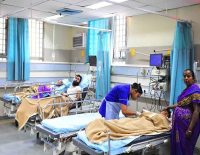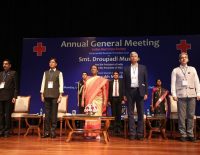‘First Trimester Screening to identify Down Syndrome during pregnancy crucial’

Down Syndrome is a genetic condition affecting over 1,30,000 children in India annually and continues to pose significant challenges for families nationwide. All human cells typically contain 46 chromosomes. However, in those with Down syndrome, there is an extra copy of chromosome 21, resulting in a total of 47 chromosomes. Children born with the condition can face various health challenges, including deficits in brain development, heart disease, thyroid gland dysfunction, vision impairment, and hearing loss.
On the occasion of World Down Syndrome Day, experts from Amrita Hospital, Kochi, highlight the need for universal first-trimester screening to identify pregnancies affected with Down syndrome. “Discovering the condition post-birth often leaves families unprepared and anxious. Hence, it is imperative to adopt Universal First Trimester Screening, employing biochemical marker measurements in blood and ultrasound examinations, which boasts up to 90 percent accuracy in identifying fetal risk,’’ said Dr. Sheela Nampoothiri, Head of Paediatric Genetics, Amrita Hospital, Kochi
People with Down Syndrome are at increased risk of developing various health issues including thyroid dysfunction. In the study,13.5 percent children with Down syndrome were found to have thyroid dysfunction which particularly aggravate the mental handicap if not addressed at the earliest opportunity, she added.
The testing methodology helps to identify the chances of Down syndrome in the unborn child. Even though Down syndrome is a condition which can be diagnosed clinically it is extremely important to do a karyotype analysis. It will help the family identify the chances of recurrence of Down syndrome in their next pregnancy especially in cases when the first pregnancy is found to have a child with Down syndrome. There are three types of Down syndrome. Non -Disjunction, Translocation and Mosaic Down syndrome.
Down Syndrome, which is the most common chromosomal disorder in humans resulting from aberrant cell division either in the sperm or ovum, leads to non-disjunction type of Down syndrome, the most common type of Down syndrome. 90 percent of cases of Down syndrome are of the non-disjunction type. Chromosome 21, which is present as an additional copy is obtained by chance from either of the parents. This type of Down syndrome has only 1 per cent recurrence risk.
In Translocation type of Down syndrome, one of the chromosomes 21 is attached on top of either 13,14,15 or 22 chromosome and in such cases either mother or father can be the carriers. If the father is the carrier, the chances of the next child getting it are 3 per cent and if the mother is the carrier, it is 10 per cent. So, it is extremely important to conduct karyotyping for both parents. Another extremely rare translocation carrier type is with chromosome 21 over 21 for either of the parents, the risks of recurrence in every pregnancy are 100 percent irrespective of the parent of origin.
The third category, Mosaic down syndrome, which comprises the remaining 5 percent is relatively low on risk. Another significant testing methodology, Non-Invasive Prenatal Testing (NIPT) a recent testing methodology and an ideal screening test which can be employed from 10 weeks of pregnancy from mothers’ blood has 99% specificity to pick up Down syndrome.
Dr. Krishna Kumar, Head and Professor, Pediatric Cardiology, Amrita Hospital, Kochi, highlighted the prevalence of heart problems in children with Down Syndrome, emphasizing the need for timely intervention. Addressing these concerns, early intervention significantly improves the quality of life for affected individuals,” he asserted. Heart-related disorders are seen in around 50% patients with Down syndrome and the quality of life of the baby can be improved if the treatment is taken as early as possible. The perception of parents that there is no benefit in solving the heart problem of their child with Down syndrome is changing. The most common heart defect in such babies is the presence of a hole in the heart. Early surgery will help improve the growth and quality of life of the baby.”








Comments